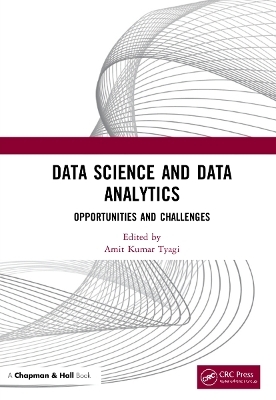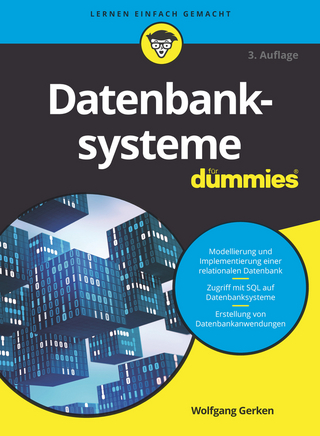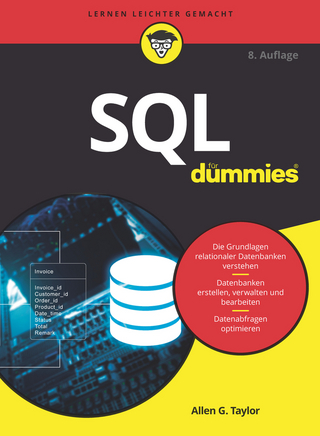
Data Science and Data Analytics
Chapman & Hall/CRC (Verlag)
978-0-367-62882-6 (ISBN)
Data science is a multi-disciplinary field that uses scientific methods, processes, algorithms, and systems to extract knowledge and insights from structured (labeled) and unstructured (unlabeled) data. It is the future of Artificial Intelligence (AI) and a necessity of the future to make things easier and more productive. In simple terms, data science is the discovery of data or uncovering hidden patterns (such as complex behaviors, trends, and inferences) from data. Moreover, Big Data analytics/data analytics are the analysis mechanisms used in data science by data scientists. Several tools, such as Hadoop, R, etc., are used to analyze this large amount of data to predict valuable information and for decision-making. Note that structured data can be easily analyzed by efficient (available) business intelligence tools, while most of the data (80% of data by 2020) is in an unstructured form that requires advanced analytics tools. But while analyzing this data, we face several concerns, such as complexity, scalability, privacy leaks, and trust issues.
Data science helps us to extract meaningful information or insights from unstructured or complex or large amounts of data (available or stored virtually in the cloud). Data Science and Data Analytics: Opportunities and Challenges covers all possible areas, applications with arising serious concerns, and challenges in this emerging field in detail with a comparative analysis/taxonomy.
FEATURES
Gives the concept of data science, tools, and algorithms that exist for many useful applications
Provides many challenges and opportunities in data science and data analytics that help researchers to identify research gaps or problems
Identifies many areas and uses of data science in the smart era
Applies data science to agriculture, healthcare, graph mining, education, security, etc.
Academicians, data scientists, and stockbrokers from industry/business will find this book useful for designing optimal strategies to enhance their firm’s productivity.
Amit Kumar Tyagi is Assistant Professor (Senior Grade), and Senior Researcher at Vellore Institute of Technology (VIT), Chennai Campus, India. He earned his PhoD. in 2018 from Pondicherry Central University, India. He joined the Lord Krishna College of Engineering, Ghaziabad (LKCE) from 2009-2010, and 2012-2013. He was an Assistant Professor and Head - Research, Lingaya’s Vidyapeeth (formerly known as Lingaya’s University), Faridabad, Haryana, India in 2018-2019. His current research focuses on Machine Learning with Big data, Blockchain Technology, Data Science, Cyber Physical Systems, Smart and Secure Computing and Privacy. He has contributed to several projects such as "AARIN" and "P3- Block" to address some of the open issues related to the privacy breaches in Vehicular Applications (such as Parking) and Medical Cyber Physical Systems (MCPS). He has published more than 8 patents in the area of Deep Learning, Internet of Things, Cyber Physical Systems and Computer Vision. He was recently awarded best paper award for paper titled "A Novel Feature Extractor Based on the Modified Approach of Histogram of oriented Gradient", ICCSA 2020, Italy (Europe). He is a regular member of the ACM, IEEE, MIRLabs, Ramanujan Mathematical Society, Cryptology Research Society, and Universal Scientific Education and Research Network, CSI and ISTE.
Section I: Introduction about Data Science and Data Analytics 1. Data Science and Data Analytics: Artificial Intelligence and Machine Learning Integrated Based Approach 2. IoT Analytics/Data Science for IoT 3. A Model to Identify Agriculture Production Using Data Science Techniques 4. Identification and Classification of Paddy Crop Diseases Using Big Data Machine Learning Techniques Section II Algorithms, Methods, and Tools for Data Science and Data Analytics 5. Crop Models and Decision Support Systems Using Machine Learning 6. An Ameliorated Methodology to Predict Diabetes Mellitus Using Random Forest 7. High Dimensionality Dataset Reduction Methodologies in Applied Machine Learning 8. Hybrid Cellular Automata Models for Discrete Dynamical Systems 9. An Efficient Imputation Strategy Based on Adaptive Filter for Large Missing Value Datasets 10. An Analysis of Derivative-Based Optimizers on Deep Neural Network Models Section III: Applications of Data Science and Data Analytics 11. Wheat Rust Disease Detection Using Deep Learning 12. A Novel Data Analytics and Machine Learning Model towards Prediction and Classification of Chronic Obstructive Pulmonary Disease 13. A Novel Multimodal Risk Disease Prediction of Coronavirus by Using Hierarchical LSTM Methods 14. A Tier-based Educational Analytics Framework 15. Breast Invasive Ductal Carcinoma Classification Based on Deep Transfer Learning Models with Histopathology Images 16. Prediction of Acoustic Performance Using Machine Learning Techniques Section IV: Issue and Challenges in Data Science and Data Analytics 17. Feedforward Multi-Layer Perceptron Training by Hybridized Method between Genetic Algorithm and Artificial Bee Colony 18. Algorithmic Trading Using Trend Following Strategy: Evidence from Indian Information Technology Stocks 19. A Novel Data Science Approach for Business and Decision Making for Prediction of Stock Market Movement Using Twitter Data and News Sentiments 20. Churn Prediction in Banking the Sector 21. Machine and Deep Learning Techniques for Internet of Things Based Cloud Systems Section V: Future Research Opportunities towards Data Science and Data Analytics 22. Dialect Identification of the Bengali Language 23. Real-Time Security Using Computer Vision 24. Data Analytics for Detecting DDoS Attacks in Network Traffic 25. Detection of Patterns in Attributed Graph Using Graph Mining 26. Analysis and Prediction of the Update of Mobile Android Version
| Erscheinungsdatum | 24.09.2021 |
|---|---|
| Zusatzinfo | 73 Tables, black and white; 215 Line drawings, black and white; 17 Halftones, black and white; 232 Illustrations, black and white |
| Sprache | englisch |
| Maße | 178 x 254 mm |
| Gewicht | 993 g |
| Themenwelt | Mathematik / Informatik ► Informatik ► Datenbanken |
| Mathematik / Informatik ► Informatik ► Theorie / Studium | |
| Mathematik / Informatik ► Mathematik | |
| ISBN-10 | 0-367-62882-1 / 0367628821 |
| ISBN-13 | 978-0-367-62882-6 / 9780367628826 |
| Zustand | Neuware |
| Haben Sie eine Frage zum Produkt? |
aus dem Bereich


